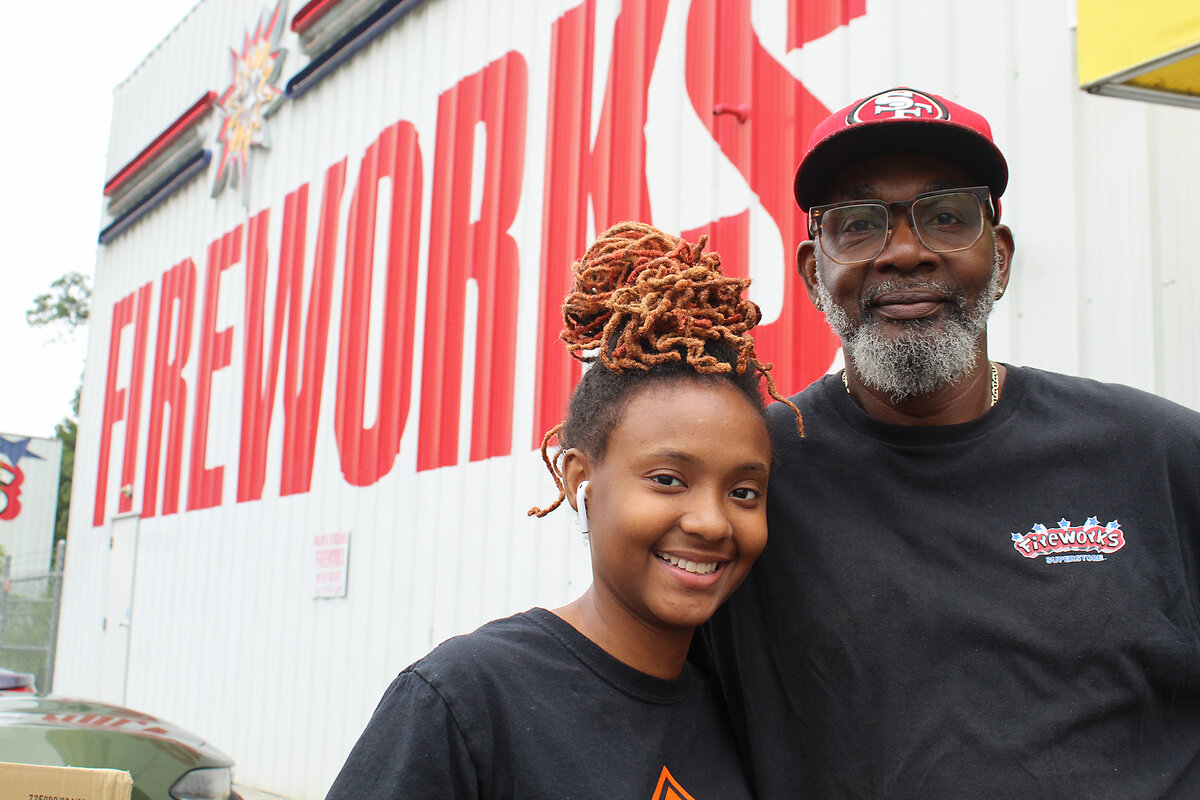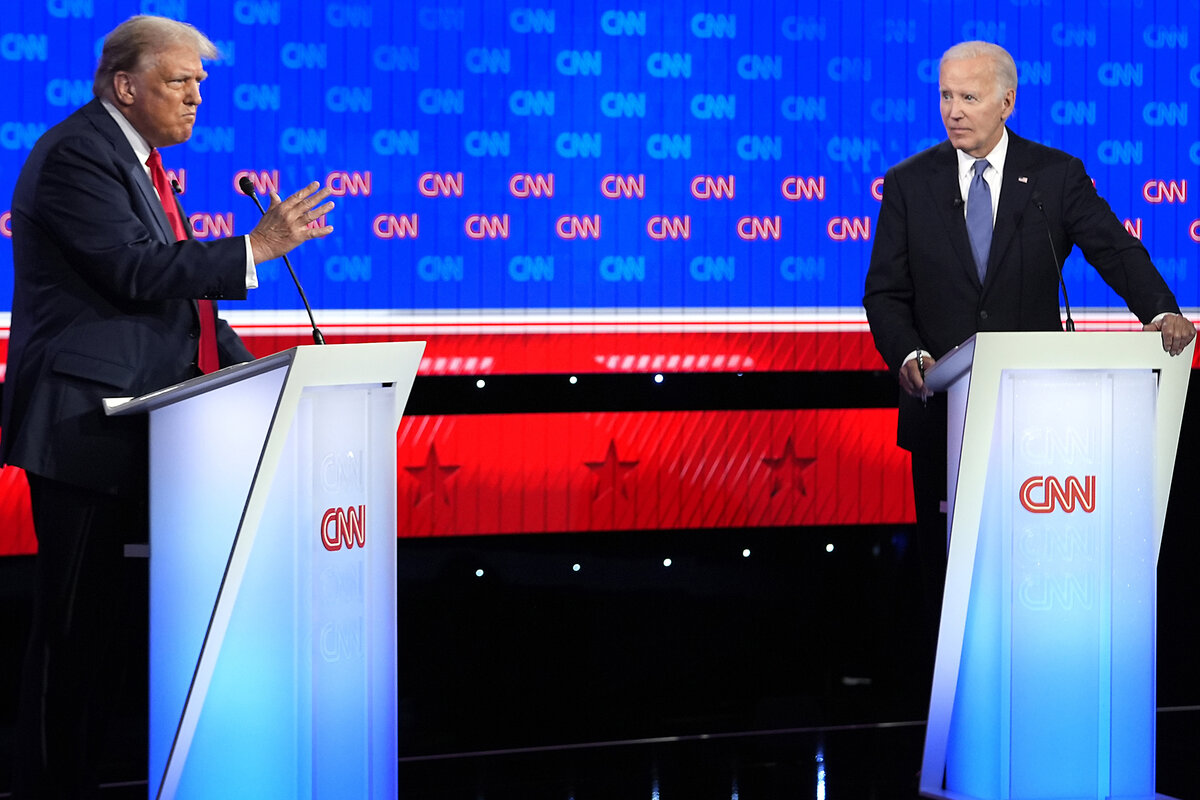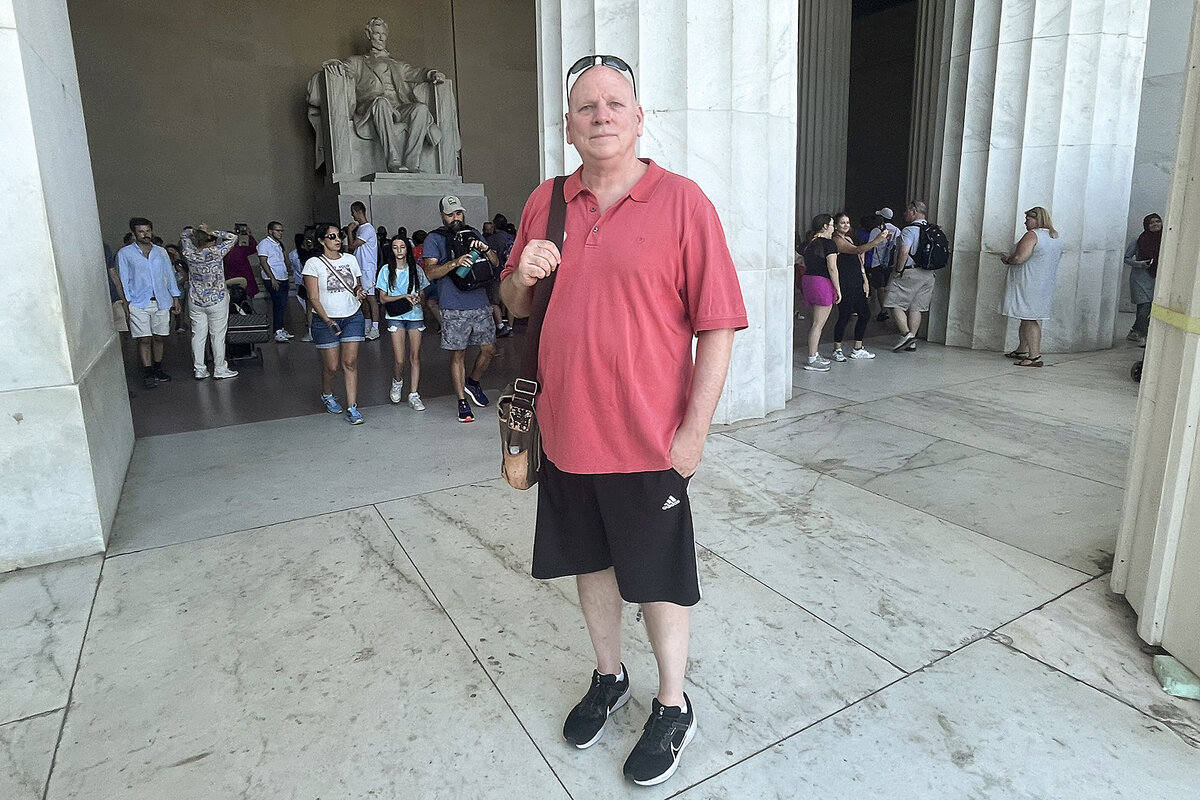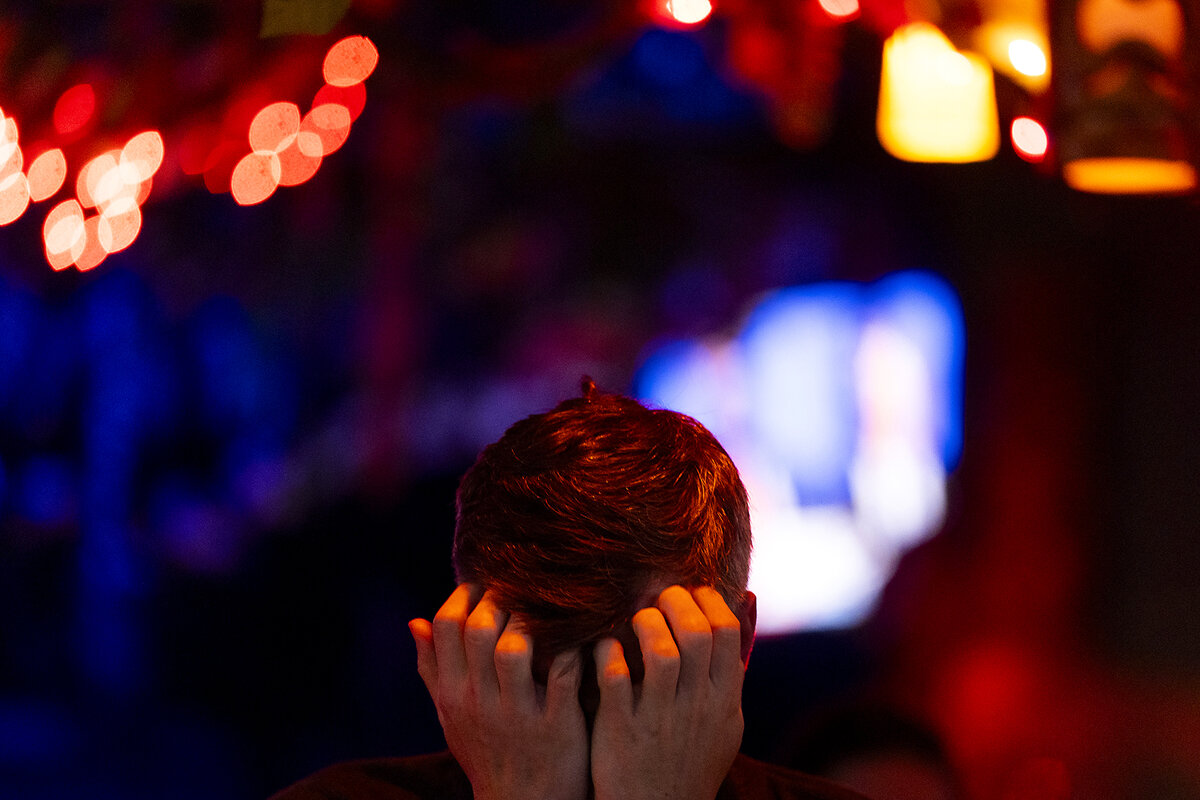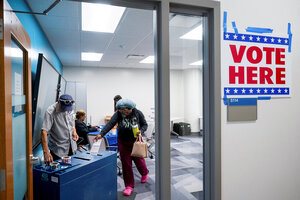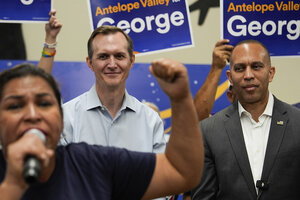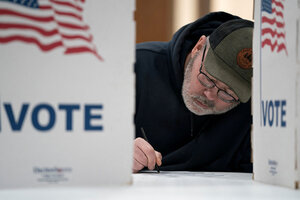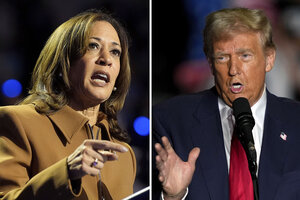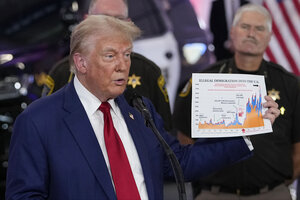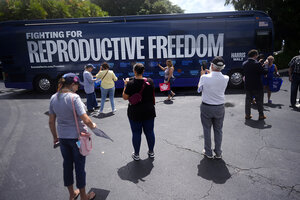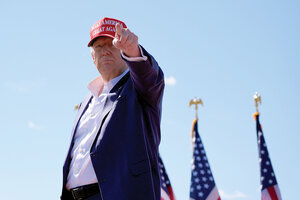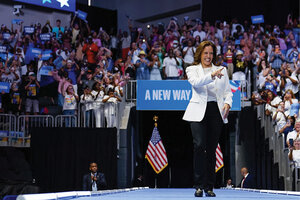On a day to celebrate US democracy, many Americans are worried about it
Loading...
| Washington; and Hardeeville, S.C.
The week leading up to the Fourth of July is usually boom times at Phantom Fireworks, just off the Interstate 95 on-ramp in Hardeeville, South Carolina. This year, there’s been a damper.
“We’re usually packed this time of year,” says manager Fred O’Neal. “But sales have been medium at best, I’d say.”
Mr. O’Neal, a nonaffiliated voter who has pulled the lever for both parties, blames inflation for the slow sales. But he also thinks something else is going on: a deep dissatisfaction with where the United States is headed, emblematized by the choice between two aging and unpopular presidential front-runners – both of whom, the Army veteran says, display a dispiriting “lack of vision.”
Why We Wrote This
On the eve of America’s Independence Day, the country is united in feeling pessimistic about the country’s future. But they disagree about why.
It might be America’s birthday, but many aren’t in a celebratory mood.
Americans have been unhappy about the direction of the country since the mid-2000s, according to polls. But recent years have accelerated their unease. President Donald Trump’s tumultuous first term was capped by a chaotic and divisive response to the COVID-19 pandemic, emotionally charged Black Lives Matter protests after the police murder of George Floyd, and Mr. Trump’s unprecedented attempts to overturn his 2020 election loss, which led to the Jan. 6, 2021, Capitol riot.
President Joe Biden has hewed much more closely to traditional presidential norms. But Americans’ anxieties over a sharp spike in the cost of living, as well as a string of polarized decisions by the conservative-dominated Supreme Court, have continued to fuel tensions – as have growing concerns about the president’s mental acuity.
Conversations with people from more than a half-dozen states in the days leading up to Independence Day reflect a reality backed up by poll after poll: Americans are worried about the state of their democracy. Many feel something has gone amiss with the very soul of the nation. And few have confidence in their leaders to fix it.
“People are pretty distressed,” says Celinda Lake, a top Democratic pollster.
Ms. Lake, who is currently doing work for Mr. Biden’s reelection with the Democratic National Committee and was one of the president’s main pollsters in 2020, says that voters are worried about the cost of living and don’t think the “American dream is possible for the next generations.” But, she adds, they are also deeply concerned about societal divisions and threats to their personal freedoms.
“They are very worried about democracy, although ‘threat to democracy’ means different things to different people,” says Ms. Lake.
Conservatives grew more upset about the direction of the country in the wake of the 2020 election, which Mr. Trump claimed without evidence had been stolen from him. They also pushed back against COVID-19 mask and vaccine mandates, as well as school closures advocated mostly by Democrats that bled into Mr. Biden’s first year in office. Some seemed ready to move on from Mr. Trump – but rallied around him when he was charged in four separate criminal cases, seeing it as a weaponization of the justice system for political purposes.
Liberals are becoming increasingly alarmed that the country may be in an interregnum between two nightmarish Trump terms – a feeling that has grown to something like panic after Mr. Biden’s disastrous debate performance last week. Many independents feel they’re being forced to choose between a president showing signs of mental and physical decline, whom many in his own party want to drop out, and a bullying and reckless former president with a track record of testing the law and the Constitution.
Ms. Lake says all that has made the current holiday feel even more fraught. Like Thanksgiving, the Fourth of July has traditionally been a time when Americans come together with family and community, put aside their differences, and celebrate the country. But many Americans now feel apprehensive about events that bring them together with people whose views they don’t share.
“This time that would usually be this culmination of good feeling is actually a real flash point of bad feelings right now,” Ms. Lake says.
More than three-quarters of Americans are currently dissatisfied with the way things are going in the U.S., according to Gallup’s most recent survey. In 2001, by contrast, 7 in 10 Americans were satisfied with the way things were going, according to the long-running poll. Satisfaction dipped below 30% in 2007, and fell below 20% with regularity during both President Trump’s and President Biden’s terms.
A widespread sense of the nation being on the wrong track bubbles up in conversations with voters across the country.
Daniel Ferko, a Navy veteran from Cleveland, was at the National Mall in Washington on Monday, trying to squeeze in some quiet time before the crowds showed up to “walk, reflect, and pray.”
A two-time Trump voter who plans to vote for the former president again, Mr. Ferko said he tuned in to the presidential debate, but found it “painful to watch.”
While unhappy with his choices, however, he was just as frustrated with others’ lack of civic involvement.
“You have to participate. You have to participate at the local level; you have to participate at the state level, the federal level,” he said. “All you got to do is vote. There’s a lot of people buried over there [at Arlington National Cemetery] that never had the chance. But they gave their lives for it.”
Humberto Gonzalez, a construction worker from Denver visiting the Lincoln Memorial, said that this Fourth of July he doesn’t feel the same excitement as in the past “because of the politics” of the moment.
“The direction we’re headed – it’s really bad,” he said in a Spanish-language interview. “We’re heading toward hard battles, not toward things that benefit the people.”
Americans aren’t just worried about where things currently stand. They’re concerned that the center may not hold. Those on both the left and right increasingly believe the other side holds irrevocably different values that it wants to impose on the nation as a whole.
“People are more polarized, and the poles have gotten much further apart,” said Archon Fung, a Harvard University political scientist who studies polarization. As a result, “The cost of losing for either side is just much, much greater.”
That view of American politics as a zero-sum game – rather than a debate over the common good – is a departure from much of the 20th century, when the two parties overlapped more closely. And it’s a self-fulfilling prophecy that fuels more extremism.
Robert Putnam, a Harvard University social scientist and author of “Bowling Alone,” has spent decades studying and warning about how isolation in society fuels political polarization. He views Mr. Trump as a symptom more than as a catalyst of the polarization that has been growing since the 1970s in America. He says his research for his latest book, “The Upswing,” shows that Americans are more divided now than at any point since the Civil War. And while he still believes America can pull out of this spiral, he says it could take years to turn things around.
“I’m really worried,” he says. “I think anybody who is paying attention has got to be really frightened.”
It’s not just experts fretting about polarization. Ilena Moses, a recent high school graduate from Los Angeles who plans to attend Columbia University next year, says she’s been worried about it since middle school. She wants above all to keep Mr. Trump out of office, believing he did “irreparable damage to our country” during his first term, but that’s not the only reason for her lack of optimism.
“More and more, we see people who feel betrayed by the left or the right on some certain issue just jumping to the other side of the aisle, because nuance is scary and it’s easier to be part of a tribe than to think for yourself,” she says.
“We’re so afraid or ticked off at the other side that we’ll rally around whoever’s at the top – as long as they can win,” agrees Lisa Rosendale, a self-described moderate conservative from the Dallas area who voted libertarian the last two presidential elections and is married to a Biden supporter.
Ms. Rosendale says that her feeling watching the debate was sadness “that in our great and huge country, this is the best we can offer.”
That sentiment is shared by a lot of people.
“The vast majority of Americans hate a choice between these two people for president. And that includes many of the people who say they support one or the other candidate,” Republican pollster Whit Ayres says. “How are they supposed to think about a democratic political system if it offers them choices that the overwhelming majority of Americans don’t like?”
When asked how he was doing, Mr. Ayres quips, “Better than our political system – but it’s a low bar.”
Staff writers Sophie Hills, Christa Case Bryant, and Ali Martin contributed reporting to this story.





